Gardening is a truly enchanting hobby that lets us connect with nature and craft our own backyard paradise. Whether you’re a seasoned gardener or a green-thumb novice, you’ve likely come across the concept of “sunflower companion plants,” which is a fascinating approach in the world of gardening. This concept opens up a world of possibilities for creating harmonious and productive plant partnerships in your garden.
Companion planting is the practice of growing certain plants together to enhance their growth, deter pests, and improve overall garden health.
In this article, we’ll explore the fascinating world of companion planting, focusing on sunflowers. We’ll share a list of lovely sunflower companion plants, plants you shouldn’t put next to sunflowers, and much more, so let’s dive right in!
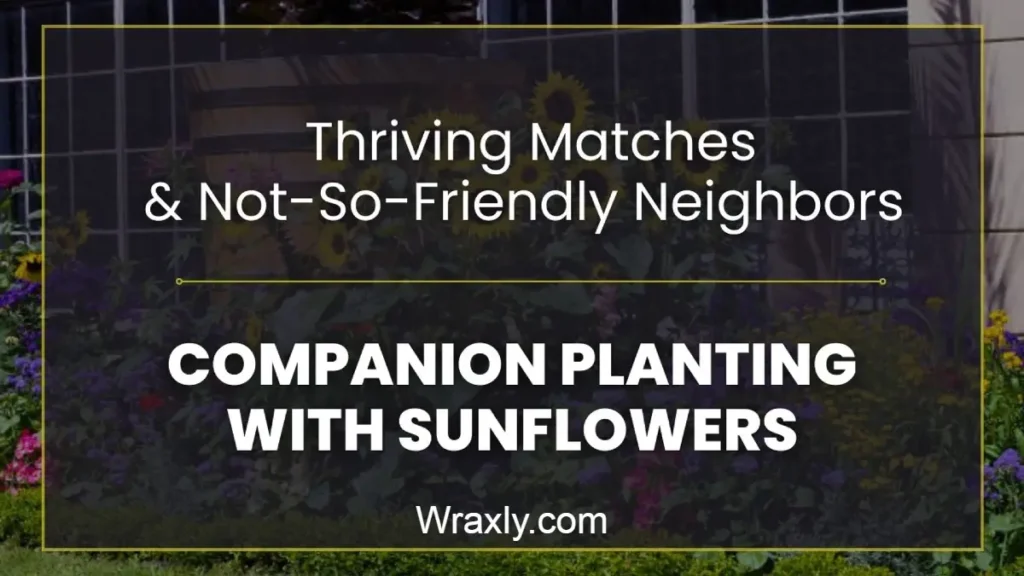
Why Plant Sunflowers?
One of the significant advantages of planting sunflowers in your garden is their ability to deter pests.
Sunflowers, while beautiful, have a secret weapon in their allelopathic nature, which means they release chemicals that inhibit the growth of certain weeds and pests.
These chemicals, including terpenes and various phenolic compounds, are emitted from all parts of the sunflower, such as its roots, leaves, stems, flowers, and seeds.
This allelopathic trait is a natural defense mechanism for sunflowers, giving them a competitive edge in the garden.
This allelopathic quality makes sunflowers excellent companions for crops susceptible to pest damage, such as tomatoes, cucumbers, and lettuce.
Planting sunflowers alongside these vegetables can help protect them from destructive insects while the sunflowers remain largely unaffected.

Moreover, it’s fascinating to note that sunflowers also release a subtle scent that can attract beneficial insects like ladybugs and parasitic wasps.
These natural predators are a boon for garden health, as they help control common garden pests.
This symbiotic relationship creates a holistic and self-sustaining ecosystem within your garden, where sunflowers not only act as protectors but also serve as welcoming hosts for these helpful insects.
Sunflower Companion Plants: 5 Thriving Matches
Sunflowers can make excellent companions for several other plants in the garden. Here are some good companion plants for sunflowers:
1. Corn
Sunflowers and corn are an incredible duo in the garden, and when it comes to sunflower companion plants, they truly shine! These two plants have a remarkable synergy that can benefit your garden in numerous ways. Sunflowers can play a vital role in supporting other plants, and one of their fantastic companions is corn.
Sunflowers, with their towering and majestic presence, are not just about their beauty; they also offer valuable assistance to neighboring crops. When it comes to corn, their shorter stature can sometimes be overshadowed by taller plants in the garden. This is where sunflowers come to the rescue! They make excellent support structures for climbing beans, giving these vines the perfect opportunity to thrive.
This arrangement can also help with shade and wind protection.
2. Pumpkins and Squash
These plants can benefit from the shade provided by sunflowers, which can help conserve moisture and protect the soil.
3. Marigolds
Marigolds can act as companion plants to sunflowers by helping deter certain pests that affect sunflowers and other garden plants.
4. Nasturtiums
Nasturtiums can help repel aphids and other insects that might damage sunflowers.
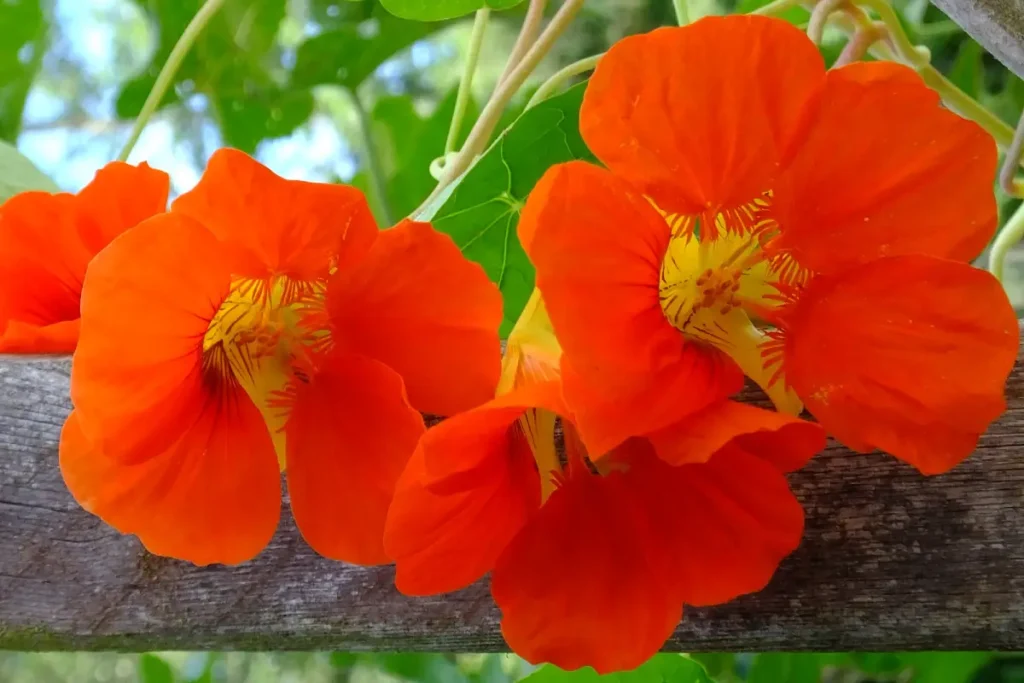
5. Beans
When it comes to sunflower companion plants, sunflowers and pole beans might not be the best match due to allelopathy. However, consider planting bush beans or low-growing bean varieties alongside your sunflowers for a more harmonious garden. These shorter beans won’t be overshadowed and will thrive in the company of sunflowers.
Not-So-Friendly Neighbors
While sunflowers can be excellent companions for many plants, you should know their not-so-friendly neighbors.
Some plants may struggle to coexist with sunflowers due to various factors, such as competition for resources or incompatible growth habits.
1. Potatoes
Planting sunflowers and potatoes together isn’t a good idea because they like different types of soil. Sunflowers do well in well-drained soil with average nutrients, while potatoes need soil that holds water and is rich in nutrients.
Another problem is that sunflowers release chemicals that can stop the growth of some plants, including potatoes. When you put these plants close together, they have to compete for water and nutrients in the soil.
Plus, the chemicals from sunflowers can make it even harder for the potatoes to grow. This can lead to both plants growing smaller than they should.
Therefore, if you want to help the growing of the sunflowers and potatoes, it’s better to plant them in different areas or arrange your garden so they have the soil they like without getting in each other’s way.

2. Cabbage Family (Brassicas)
Plants like cabbage, broccoli, and cauliflower are part of the Brassica family and are sensitive to allelopathic chemicals produced by sunflowers.
These chemicals can inhibit the growth of Brassicas and negatively affect their development. It’s best to keep sunflowers away from these crops.
3. Low-Growing Plants
Sunflowers’ tall and wide growth habits can overshadow and shade out low-growing plants, like lettuce or spinach.
To prevent these smaller plants from being deprived of sunlight, provide ample spacing between sunflowers and low growers, or plant them in separate areas of your garden.
Additional Tips for Beginners
Here’s a list of helpful gardening tips for sunflower enthusiasts:
1. Nurturing Soil Health
Sunflowers have deep roots that penetrate the soil, breaking up compacted earth and improving aeration. This helps enhance the overall health of your garden’s soil, making it more conducive to plant growth.
Their extensive root system also helps to extract nutrients from deep within the soil, which benefits neighboring plants by making these nutrients more accessible.
Consider planting sunflowers near nutrient-hungry vegetables like corn or squash for a mutually beneficial relationship.
The beneficial effects of sunflowers on soil health go beyond their deep roots. When sunflowers reach the end of their life cycle and begin to wilt, you can leave them in the garden as natural mulch.
As the sunflower leaves and stems decompose, they release valuable organic matter back into the soil, enriching it with nutrients and improving its water retention capacity.
This natural recycling process is a testament to the sustainability and regenerative potential of companion planting with sunflowers.
Recommended Sunflower Seeds
| Image | Title | Prime | Buy |
|---|---|---|---|
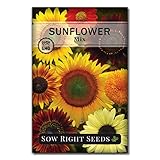 Top
Top | Sow Right Seeds - Large Full-Color Packet of Mixed Sunflower Seed to Plant - Non-GMO Heirloom | PrimeEligible | Check Price on Amazon |
Top Top
Top | Mini Sunflower Seeds for Planting (100 Seeds) | PrimeEligible | Check Price on Amazon |
 Top
Top | NatureZ Edge 1300+ Sunflower Seeds Variety Pack | PrimeEligible | Check Price on Amazon |
 Top
Top | Daisy Garden 100Pcs Rare Purple Sunflower Seeds | PrimeEligible | Check Price on Amazon |
 | Dwarf Sunflower Seeds for Planting | PrimeEligible | Check Price on Amazon |
 Top
Top | 1 lb (6,500+ Seeds) Sunflower Seeds - Non-GMO Seeds By MySeeds.Co (1 lb Sunflower Crazy Mix) | PrimeEligible | Check Price on Amazon |
 Top
Top | Chocolate Cherry Sunflower Seeds for Planting – 150+ Seeds | PrimeEligible | Check Price on Amazon |
2. Spacing Matters
Sunflowers can grow tall and wide, creating shading and competition for resources if not planted with consideration.
For instance, sunflowers may not be the best companion for low-growing herbs like basil or oregano, which can be overshadowed and deprived of sunlight.
Always make sure to leave enough space between sunflowers and their companions to avoid such conflicts.
3. Incompatible Soil Preferences
Different plants have varying soil preferences, and this can lead to incompatible growing conditions. Sunflowers thrive in well-drained soil with moderate fertility, while some plants, like potatoes, prefer moist, nutrient-rich soil.
Planting these two together can result in one plant suffering due to unfavorable soil conditions. You should match the soil preferences of sunflowers with their companions to avoid such issues.
Sunflower Companion Planting Success Stories
To illustrate the benefits of companion planting with sunflowers, let’s take a closer look at a few success stories:
1. Three Sisters Garden
The “Three Sisters” gardening technique, employed by Native American tribes for centuries, combines corn, beans, and squash, with sunflowers often added as a fourth sister.
In this system, sunflowers provide support for the corn and beans to climb while also protecting them from pests. The large leaves of the squash create a natural mulch, conserving moisture and suppressing weeds.
This harmonious combination demonstrates the power of companion planting.
2. Marigolds and Sunflowers
Marigolds have pest-repelling properties. When planted alongside sunflowers, they help deter aphids, nematodes, and other harmful insects that can damage sunflower plants.
This combination not only keeps the sunflowers healthy but also adds a burst of color and diversity to your garden.
While we’ve focused on sunflowers as companions, it’s important to understand that companion planting goes beyond just sunflowers.
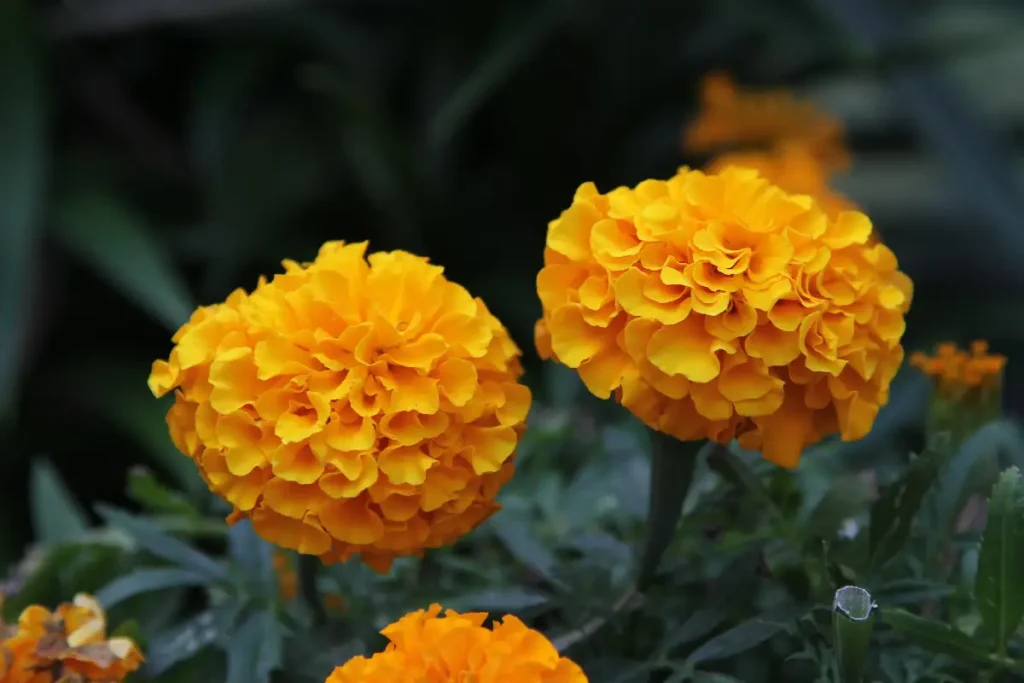
A diverse garden with a variety of companion plants can create a thriving ecosystem where each plant contributes to the well-being of others.
For instance, consider planting sunflowers alongside aromatic herbs like rosemary or thyme. These herbs can help repel pests that might otherwise be attracted to sunflowers.
Additionally, their fragrant leaves can enhance the overall garden experience.
You can also explore companion planting with other flowers like marigolds, nasturtiums, and calendulas. These colorful blooms not only add aesthetic value to your garden but also play essential roles in pest control and pollinator attraction.
The presence of diverse flowers can attract beneficial insects like bees and butterflies, which are vital for pollinating your crops.
Benefits of Sunflower Allelopathy
The allelopathic properties of sunflowers deserve a closer look. Allelopathy is the ability of a plant to release chemicals that inhibit the growth of other nearby plants.
Sunflowers are among the plants that possess this ability, which can be harnessed to benefit your garden.
When sunflowers release allelopathic chemicals into the soil, they create a zone of protection around themselves. This zone acts as a natural barrier against invasive weeds and pests.
For example, sunflowers can help deter weed growth around their base, reducing the need for manual weeding.
Furthermore, the allelopathic effects of sunflowers can extend beyond their immediate vicinity.
Some gardeners strategically plant sunflowers at the borders of their garden beds to create a protective buffer that wards off unwanted pests and weeds from infiltrating the entire garden.
The process of allelopathy also illustrates the complexity and interconnectedness of plant relationships in the garden.
While some plants may inhibit the growth of others, this natural competition can lead to a balance that benefits the overall health of the garden.
For Further Reading
- How to Grow Teddy Bear Sunflowers
- How to Grow Sunflowers in a Pot
- Lavender Companion Plants
- Blueberry Companion Plants
- Spinach’s Garden Allies: The Top Vegetables, Herbs, and Flowers for Companion Planting
Final Thoughts on Sunflower Companion Plants
Companion planting with sunflowers can transform your garden into a thriving ecosystem where plants support and protect each other.
By selecting the right companions and understanding their needs, you can maximize the benefits of this age-old gardening technique.

Darrell has a passion for gardening that he inherited from his father. Go here to read more about the influence his father played in his love for gardening. If you want to send Darrell a quick message, then visit his contact page here.

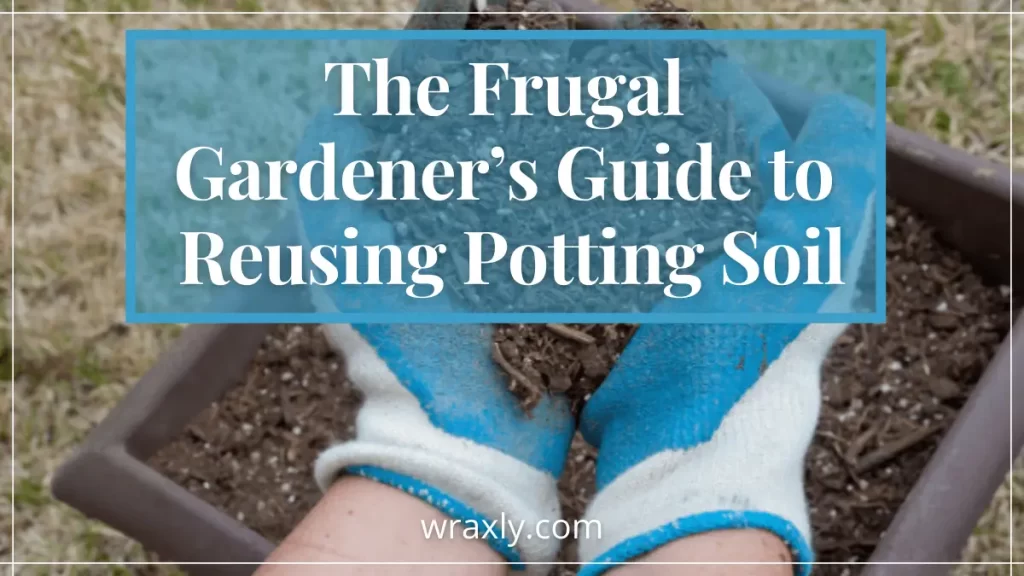

![10 Common Container Garden Mistakes to Avoid [Beginner’s Guide]](https://wraxly.com/wp-content/uploads/2021/02/10-Common-Container-Garden-Mistakes-to-Avoid-Beginners-Guide-1200-1024x576.webp)
